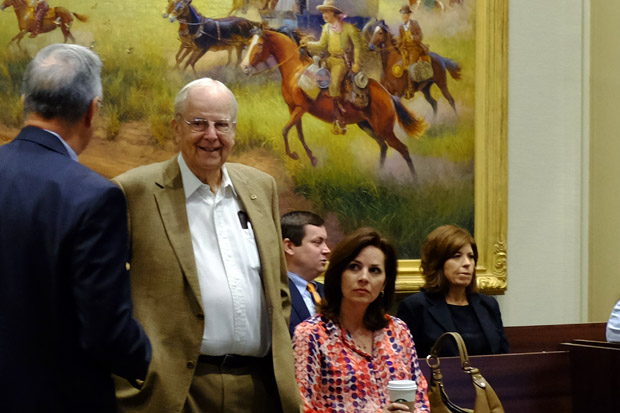
Frank Robson, a wind farm opponent and property developer from Claremore, Okla., at an Oct. 21 Senate hearing on tax incentives for the wind industry.
Joe Wertz / StateImpact Oklahoma


Frank Robson, a wind farm opponent and property developer from Claremore, Okla., at an Oct. 21 Senate hearing on tax incentives for the wind industry.
Joe Wertz / StateImpact Oklahoma

Joe Wertz / StateImpact Oklahoma
Frank Robson, a wind farm opponent and property developer from Claremore, Okla., at an Oct. 21 Senate hearing on tax incentives for the wind industry.
Members of the state Senate Finance Committee heard testimony on Tuesday from the wind industry and a representative of a group of property owners pushing for stricter regulation of wind farms.
The Senate study centered on the cost-benefit of tax credits and incentives used by the wind industry. Supporters said Oklahoma’s incentives attract projects that might otherwise be built in other states with similar wind potential, including sites in Kansas, Nebraska and Texas.
The hearing was part of an interim study requested by Sen. Mike Mazzei, R-Tulsa. A state House committee held a similar hearing earlier this month, and the Corporation Commission has been examining other wind industry issues, including turbine siting, notification and decommissioning.
The Tulsa World‘s Barbara Hoberock reports:
Oklahoma has invested about $120 million for a $6.1 billion return brought by wind developers in the state, said Jeff Clark, executive director of the Wind Coalition, a trade group.
Rep. Earl Sears, R-Bartlesville, asked [the Wind Coalition’s Jeff] Clark when the industry could stand on its own in Oklahoma.
“Probably when they end incentives for everyone else,” Clark said.
State subsidies for the wind industry totaled roughly $44 million in 2013, and are projected to exceed $66 million by 2018, Oklahoma Tax Commission data requested by the panel show.
Rick Mosier of the Oklahoma Property Rights Association said the incentives were a “blank check” the state couldn’t afford.
“There is no cap or control over the amount of wind development in Oklahoma and consequentially there is no cap or control over the amount of tax credits the state will become obligated for.”